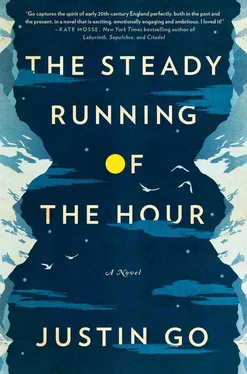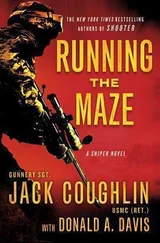General Bruce was forced back by recurring Malaria; our physician Hingston shall accompany him to Darjeeling and rejoin the expedition, and we are optimistic the General shall recover. Colonel Norton, a good fellow & an able climber, takes over as expedition leader. Still it is a blow to lose the General, and hardly the best of omens on a journey dependent upon the labour of superstitious hill people.
It is whispered that evil portents have followed this expedition since its departure: the Bhotia boy who witnessed errant stars in the mid-day sky, then flashes of sunlight upon the evening sky; the band of vultures who pursue us relentlessly across Tibet, hovering beside the camp in spite of the volleys of stones we throw at them; the strange fantastical dreams we have all been having. Hingston attributes the dreams to the effect of thin air upon the sleeping brain. But the porters see the dreams as visions of the past & future alike.
Most fancifully, our interpreter confided to me that Price’s eyes were as dark as any Asiatic’s when he first came to Everest in ’21, and that they changed colour to blue after the ghastly avalanche in ’22. Of course this is pure fantasy, and yet I had to admit I could not remember Hugh having blue eyes when I first knew him. I could not remember his eyes at all. The porters earnestly believe that Price is marked for death within the month, and that if he were to cup his ears he would not hear the usual whirling sound that marks us as earthly creatures, but only the terrific silence of the dead. I have not relayed this news to Hugh.
As the landscape grows monumental, all my feelings expand in proportion. One cannot describe how lonely this place is when one is feeling stricken. We are meant to go to the summit — one peak amongst dozens here — for King, country & Empire; to advance knowledge; for human progress; to further our reputations as climbers & as Englishmen.
In truth each man climbs for his own reasons: the Colonel, from a sense of duty & honour, and a notion of England that should not have survived Victoria, let alone Passchendaele; Somervell, for the love of mountains & their scientific riddles, forever unanswered; Mills, for good sportsmanship & the sheer joy of it, as if climbing Everest were no different than rowing the college Eight; and Price, most elusive of all, who climbs not because he wishes to but because he must, as he alone is privy to the mountain’s deep secret.
But why should I climb? All my interest in posterity, or winning glory for my country, was long ago buried at Empress Redoubt. Nor can I argue for the advancement of knowledge — for I cannot see how Everest demands more study than any other scrap of the unknown territory around us. I cannot even plead a love of alpinism, for there is no climbing to be had yet: here we trek & suffer, trek & freeze, and the limit of our progress is not our skill with rock & rope, but our capacity to endure.
So we march through knee-deep snow, in blizzards and under a brutal Himalayan sun. The camaraderie of the party, their fine spirit & the endless toil of everyone make me pray we take Everest. But for my own sake? Most days I’m still the peak-bagger & want the summit beyond anything. When I’m low I don’t give a straw for it, thinking all conquest & records are human folly, and that what I wish for can’t be found on any summit.
But I deceive myself. This isn’t about Everest or any mountain. And some rare & precious part of me surely survived the Somme, to bring me here intact, vulnerable as I am. All my dreams die hard, but those of you are utterly imperishable.
Yours Ever,
Ashley

Chobuk
26 Apr 1924
My dear Imogen,
I’ve seen it now — I had to write to you straight away.
Last night we stayed at Pang La below the high pass. We struck camp in darkness this morning & had not gone far before Hugh took me ahead of the party, at double pace & then nearly running until we crested the pass, dizzy & gasping on its summit.
It was a spectacular vision: layer upon layer of dark barren hills, then the jagged teeth of the Himalaya towering above — Makalu & Lhotse & Cho Oyu — all seeming to bend towards a pink sky, the sunrise dazzling their western flanks. One peak reigned above all, cruel & enchanting, a hurricane of vapour streaming over her summit. It was Everest, as exquisite as the tiger’s fang & as tempting as black oblivion, for she stood miles tall & still I felt I was looking into an abyss. She seemed the remnant of some other world, a place elemental & unforgiving that left behind this mountain, to prove us trifles before the wild & howling universe.
I waited for Hugh to speak, but he only took out the field-glasses & we scanned the upper mountain for what seemed hours, searching for flattish places to pitch our high camp, imagining obstacles amongst specks of rock 35 miles distant. We shall soon get a better view — we are three days’ march from our base camp, and the sight of Everest puffed new life into our tired party, though already the wind pushed much of it back out.
We are camped amongst the willows of Chobuk monastery. The tent wall is wet against my head & I halt frequently to grease my face from a little pot that stays beside me all night. For the Tibetan plain has broken my skin raw, which was never made for such a hostile climate. All the other Sahibs have grown beards against the wind, but my attempt was pitiable & I gave it up.
On a bench outside, Mills wrenches away at the oxygen kit by hurricane lamp. Over in the mess tent, Price & the Colonel debate the plans & personnel for the summit assault. There shall be two parties of two climbers each, one with the oxygen, one without — for it’s a beastly load at those heights, and there isn’t a fellow here who wouldn’t prefer to summit without. If only we knew that was possible. I should like to be in the natural party, but it’s likely I won’t make a climbing party at all & will be kept in support.
A runner is departing with the despatches, so I end here. The post caught us at Shegar and though I truly didn’t expect anything, still I stood beside the mailbag like a boy, remembering a parcel that came to me one day at Le Sars, a place wetter than here, but no more hospitable. I felt then — I feel now — beyond the pale, on the far side of every river and boundary that divides civilization from emptiness. But I had you; I had the parcel in my hands, a long walk back to our cellars in the rain, where there would be no dry clothes & never any time to sleep. It didn’t matter. I was young and we were together.
The post goes out now —
Yours Ever,
Ashley

Rongbuk Base Camp
29 Apr 1924
Imogen —
We arrived at Rongbuk today. I began a meek letter describing our journey, but I’ve just burned it. For I’m cold & exhausted & there isn’t any time for half-truths — the post goes out tomorrow.
How I miss spring in this wasteland of grey moraine & ice; how I miss true earnest spring of primroses & grape hyacinths & long English grass. When I return, I shall know I have at last earned such luxury.
For seven years I tried not to look at your photograph, nor your handwriting, nor any trinket that could bring you to mind. It wasn’t any use. For even here I can picture you reading this, how you recline holding these sheets, the string of beads around your neck, everything.
Читать дальше













